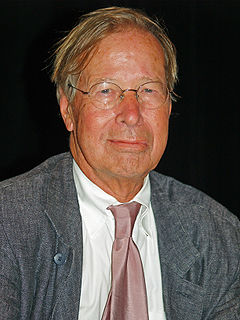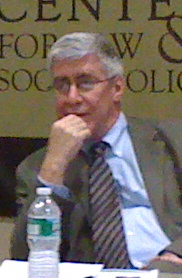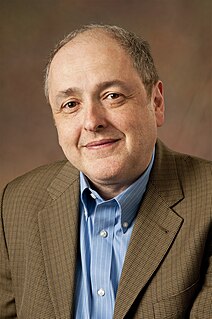Related Research Articles

Jurisprudence, or legal theory, is the theoretical study of law. Scholars of jurisprudence seek to explain the nature of law in its most general form and provide a deeper understanding of legal reasoning and analogy, legal systems, legal institutions, and the role of law in society.

Philosophy of law is a branch of philosophy that examines the nature of law and law's relationship to other systems of norms, especially ethics and political philosophy. It asks questions like "What is law?", "What are the criteria for legal validity?", and "What is the relationship between law and morality?" Philosophy of law and jurisprudence are often used interchangeably, though jurisprudence sometimes encompasses forms of reasoning that fit into economics or sociology.
Integrity is the practice of being honest and showing a consistent and uncompromising adherence to strong moral and ethical principles and values. In ethics, integrity is regarded as the honesty and truthfulness or accuracy of one's actions. Integrity can stand in opposition to hypocrisy, in that judging with the standards of integrity involves regarding internal consistency as a virtue, and suggests that parties holding within themselves apparently conflicting values should account for the discrepancy or alter their beliefs. The word integrity evolved from the Latin adjective integer, meaning whole or complete. In this context, integrity is the inner sense of "wholeness" deriving from qualities such as honesty and consistency of character. As such, one may judge that others "have integrity" to the extent that they act according to the values, beliefs and principles they claim to hold.

Legalism or Fajia is one of Sima Tan's six classical schools of thought in Chinese philosophy. Literally meaning "house of administrative methods" or "standards/law", the Fa "school" represents several branches of what have been termed realist statesmen, or "men of methods", who played foundational roles in the construction of the bureaucratic Chinese empire, with their teachings coming to temporary overt power as an ideology with the ascension of the Qin Dynasty. In the Western world, the Fajia has often been compared to Machiavellianism, and considered akin to an ancient Chinese philosophy of Realpolitik, emphasizing a realist project of consolidating the wealth and power of the state and its autocrat, with the goal of achieving order, security and stability. With their close connections to the other schools, some Legalists would go on to be a major influence on Taoism and Confucianism. Legalism remains highly influential in administration, policy and legal practice in China today.

Ronald Myles Dworkin was an American philosopher, jurist, and scholar of United States constitutional law. At the time of his death, he was Frank Henry Sommer Professor of Law and Philosophy at New York University and Professor of Jurisprudence at University College London. Dworkin had taught previously at Yale Law School and the University of Oxford, where he was the Professor of Jurisprudence, successor to renowned philosopher H. L. A. Hart. An influential contributor to both philosophy of law and political philosophy, Dworkin received the 2007 Holberg International Memorial Prize in the Humanities for "his pioneering scholarly work" of "worldwide impact." According to a survey in The Journal of Legal Studies, Dworkin was the second most-cited American legal scholar of the twentieth century. After his death, the Harvard legal scholar Cass Sunstein said Dworkin was "one of the most important legal philosophers of the last 100 years. He may well head the list."

Herbert Lionel Adolphus Hart, usually cited as H. L. A. Hart, was a British legal philosopher, and a major figure in political and legal philosophy. He was Professor of Jurisprudence at Oxford University and the Principal of Brasenose College, Oxford. His most famous work is The Concept of Law, which has been hailed as "the most important work of legal philosophy written in the twentieth century". He is considered one of the world's foremost legal philosophers in the twentieth century, alongside Hans Kelsen.

Xun Kuang, also widely known as Xunzi, was a Chinese Confucian philosopher and writer who lived during the Warring States period and contributed to the Hundred Schools of Thought. A book known as the Xunzi is traditionally attributed to him. His works survive in an excellent condition, and were a major influence in forming the official state doctrines of the Han dynasty, but his influence waned during the Tang dynasty relative to that of Mencius.
John Hart Ely was an American legal scholar known for his studies of constitutional law. He was a professor of law at Yale University from 1968 to 1973, at Harvard University from 1973 to 1982, then at Stanford University from 1982 to 1996, where he served as dean of the Stanford Law School from 1982 to 1987.

Jeremy Waldron is a New Zealand professor of law and philosophy. He holds a University Professorship at the New York University School of Law and was formerly the Chichele Professor of Social and Political Theory at All Souls College, Oxford University. Waldron also holds an adjunct professorship at Victoria University of Wellington. Waldron is regarded as one of the world's leading legal and political philosophers.
Stephen Guest, Barrister and Barrister and Solicitor, is the Professor of Legal Philosophy at the University College London Faculty of Laws.
The Book of Lord Shang is an ancient Chinese text from the 3rd century BC, regarded as a foundational work of "Chinese Legalism". The earliest surviving of such texts, it is named for and to some extent attributed to major Qin reformer Shang Yang, who served as minister to Duke Xiao of Qin from 359 BC until his death in 338 BC and is generally considered to be the father of that state's "legalism".

Joseph Grundfest is an American academic. He is the William A. Franke Professor of Law and Business at Stanford Law School and co-director of the Rock Center on Corporate Governance at Stanford University. He joined Stanford's faculty in 1990 after having served for more than four years as a Commissioner of the United States Securities and Exchange Commission, a position to which he was appointed by President Ronald Reagan.
Conventionalism is the philosophical attitude that fundamental principles of a certain kind are grounded on agreements in society, rather than on external reality. Unspoken rules play a key role in the philosophy's structure. Although this attitude is commonly held with respect to the rules of grammar, its application to the propositions of ethics, law, science, biology, mathematics, and logic is more controversial.
Gerald Dworkin is a professor of moral, political and legal philosophy. He is Distinguished Professor of Philosophy Emeritus at the University of California, Davis. In 2016–17, he was Brady Distinguished Visiting Professor of Ethics and Civic Life at Northwestern University. He has written for the Stanford Encyclopedia of Philosophy.
Topical logic is the logic of topical argument, a branch of rhetoric developed in the Late Antique period from earlier works, such as Aristotle's Topics and Cicero's Topica. It consists of heuristics for developing arguments, which are in the first place plausible rather than rigorous, from commonplaces. In other words, therefore, it consists of standardized ways of thinking up debating techniques from existing, thought-through positions. The actual practice of topical argument was much developed by Roman lawyers. Cicero took the theory of Aristotle to be an aspect of rhetoric. As such it belongs to inventio in the classic fivefold division of rhetoric.

Brian Leiter is an American philosopher and legal scholar who is Karl N. Llewellyn Professor of Jurisprudence at the University of Chicago Law School and founder and Director of Chicago's Center for Law, Philosophy & Human Values. A review in Notre Dame Philosophical Reviews described Leiter as "one of the most influential legal philosophers of our time", while a review in The Journal of Nietzsche Studies described Leiter's book Nietzsche on Morality (2002) as "arguably the most important book on Nietzsche's philosophy in the past twenty years."
This is an index of articles in jurisprudence.
Matthew Henry Kramer is an American philosopher, currently Professor of Legal and Political Philosophy at the University of Cambridge and a Fellow of Churchill College, Cambridge. He writes mainly in the areas of metaethics, normative ethics, legal philosophy, and political philosophy. He is a leading proponent of legal positivism. He has been Director of the Cambridge Forum for Legal and Political Philosophy since 2000. He has been teaching at Cambridge University and at Churchill College since 1994.
Deng Xi was a Chinese philosopher and rhetorician who was associated with the Chinese philosophical tradition School of Names. Once a senior official of the Zheng state, and a contemporary of Confucius, he was actually China's earliest renowned lawyer, teaching the people word play in lawsuits. The Zuo Zhuan and Annals of Lü Buwei critically credit Deng with the authorship of a penal code opposing and twisting that of the more Confucian Zichan. Arguing over forms and names, Deng is cited by Liu Xiang as the originator of the "Legalists" and Logicians Xing-Ming principle judging names and realities (ming-shih), likely making him an important contributor to both Chinese philosophy and the foundations of Chinese statecraft. Other than being the first known lawyer in world history, Deng also published the oldest known statute in criminology entitled the "Bamboo Law". This was meant to defy the cruel Zheng criminal code that existed in the state.

Law's Empire is a 1986 text in legal philosophy by Ronald Dworkin, in which the author continues his criticism of the philosophy of legal positivism as promoted by H.L.A. Hart during the middle to late 20th century. The book notably introduces Dworkin's Judge Hercules as an idealized version of a jurist with extraordinary legal skills who is able to challenge various predominating schools of legal interpretation and legal hermeneutics prominent throughout the 20th century. Judge Hercules is eventually challenged by Judge Hermes, another idealized version of a jurist who is affected by an affinity to respecting historical legal meaning arguments which do not affect Judge Hercules in the same manner. Judge Hermes' theory of legal interpretation is found by Dworkin in the end to be inferior to the approach of Judge Hercules.